Rovinj Tourist Board Provides PCR Tests for Guests in Private Accommodation
April 7, 2021 - In order to promote safe tourism during the pandemic, the Rovinj Tourist Board provides PCR tests for guests staying in private accommodation.
As reported by IstraIN.hr, in order to facilitate the stay of guests in Rovinj and make their stay safer, the Rovinj Tourist Board has decided to ease the situation for private renters and guests, since they need a negative PCR test to avoid quarantine to return home.
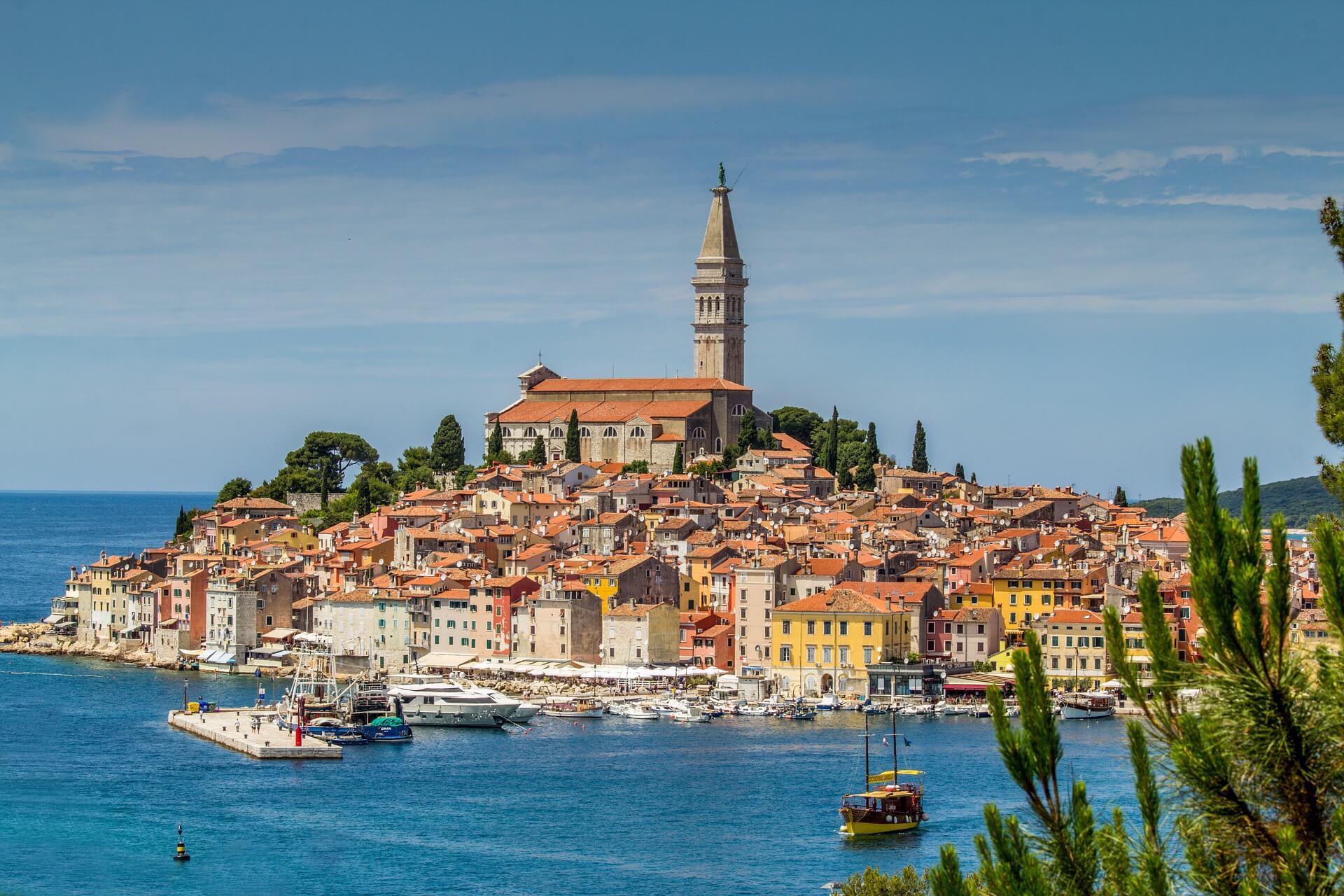
Credit: Gerald Thurner (Pixabay)
Even if new flight routes are being opened and the frequency of these are increasing as the summer season approaches, many of the tourists traveling to Croatia have to deal with the measures imposed in their own countries upon their return. For instance, tourists from many European countries had to cancel their reservations during last summer season due to the quarantine measures imposed by their governments.
As the world was hit by the third wave of the pandemic, many countries were forced to tighten measures further. Among them are numerous European countries such as Germany, which have declared Istria as a high-risk region, despite the fact that Istria is still among the European regions with the lowest incidence of infection.
On that occasion, the Rovinj Tourist Board has provided testing for guests staying in private accommodation and other smaller facilities. Testing is performed in Maistra hotels, and to register guests will need to contact the Rovinj Tourist Board by phone at +385 52 811 566 or e-mail to This email address is being protected from spambots. You need JavaScript enabled to view it..
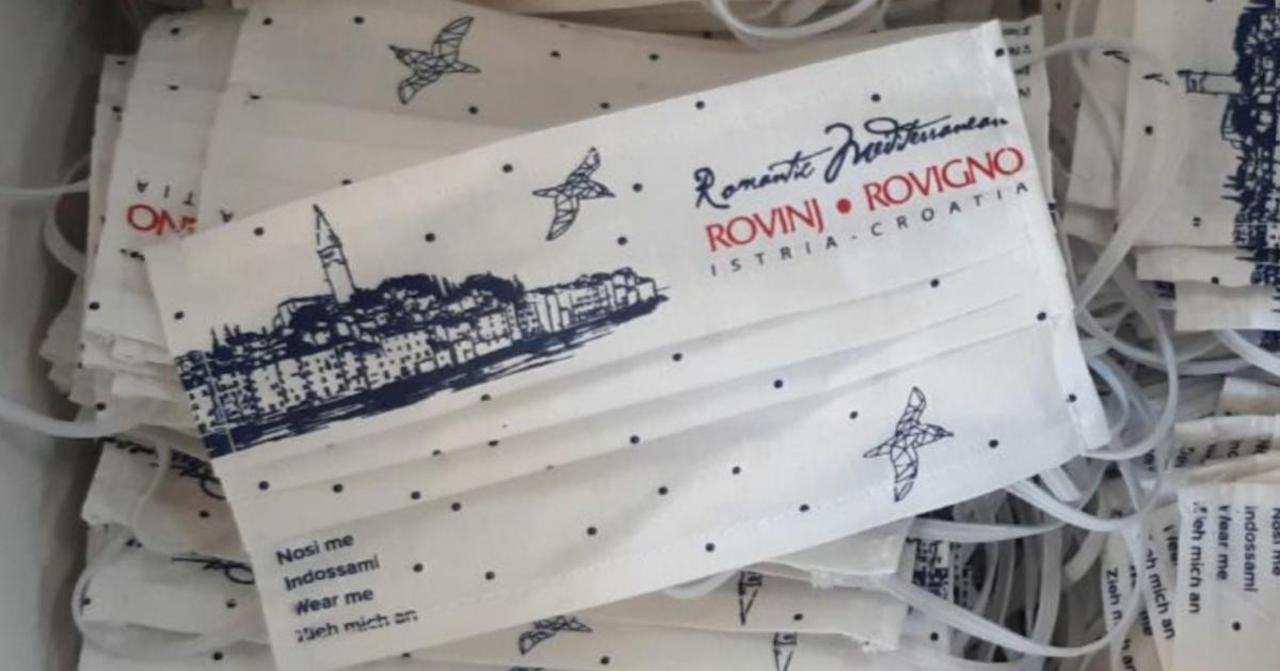
Credit: Rovinj Tourist Board
Last year the Tourist Board designed its own protective canvas face mask, which was distributed to catering employees and registered private landlords. The mask served not only as a safety measure but as an attractive souvenir for many guests as well.
In addition to masks, the Tourist Board has made a leaflet or brochure "Info COVID-19" which is intended for guests and renters, to inform guests about the procedure in case of coronavirus infection during their stay in the accommodation facility. You can find it below:
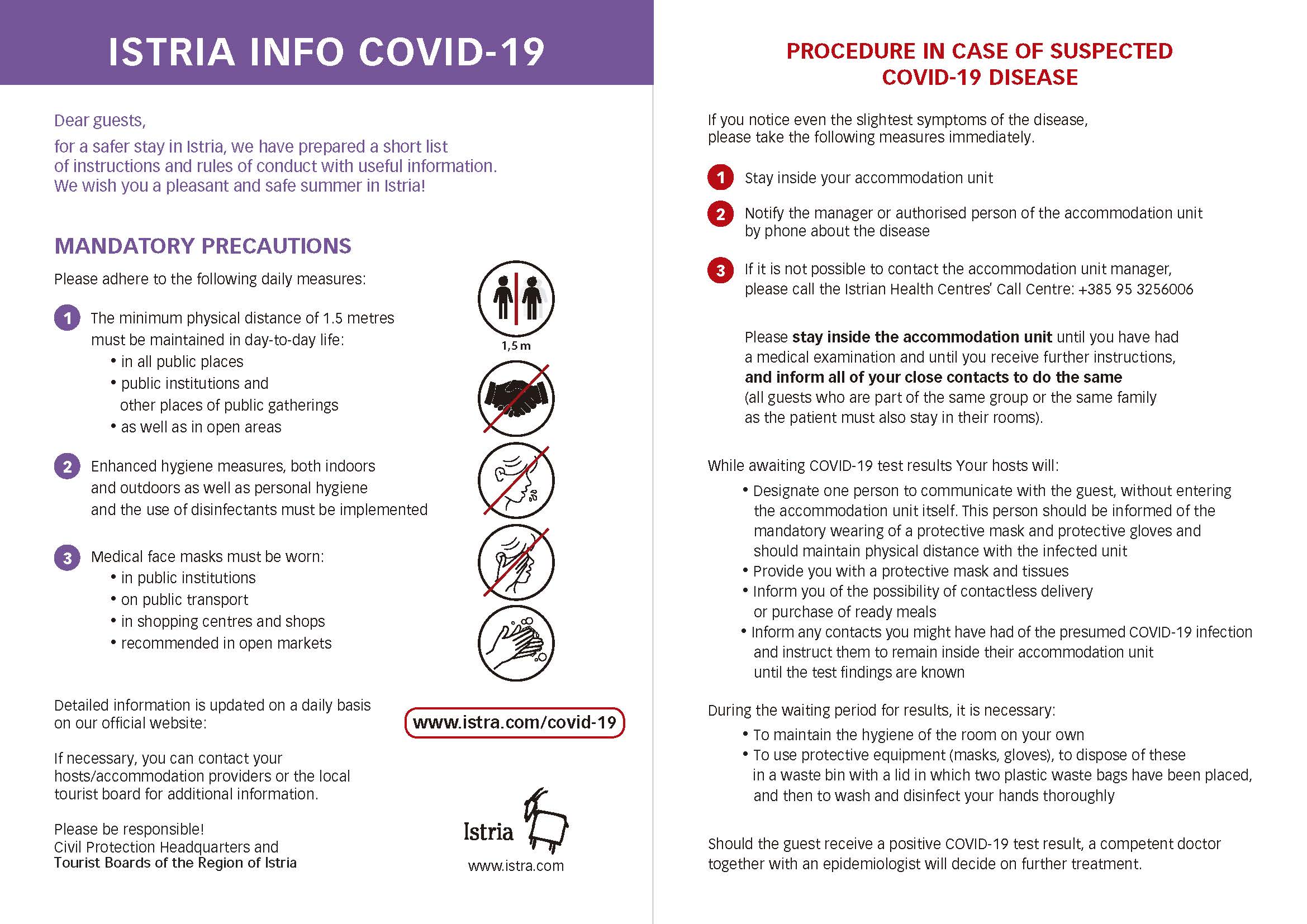
All you need to know about traveling to Rovinj can be found on our dedicated TC page.
Follow the latest travel updates and COVID-19 news from Croatia HERE.
For more on travel in Croatia, follow TCN's dedicated page.
LGBTQ Travel Safety in Croatia: 39th Most Popular Country in the World
March 9, 2021 – When it comes to traveling, Croatia has been known as a gay-friendly destination, even though not all Croatians in every part of the country are fond of accepting gay and lesbian couples. In a recent study, LGBTQ travel safety in Croatia ranks 39th on the list of 150 world's most popular countries for LGBTQ+ travel.
The research has been conducted by Asher and Lyric Fergusson, an Australian-American married couple, who write and do the research studies on topics that help travelers to travel safely. They have now taken an in-depth look at LGBTQ+ rights, country by country, reviewed individual laws and gathered data from various trusted international sources to create the definitive "LGBTQ+ Travel Safety Index" that shows safest, as well as least safe countries for LGBTQ+ travel.
After more than 250 hours of research, they made a list of 150 most (and least) popular countries, where Croatia took 39th place. We reviewed the information brought out about Croatia and added some useful information about LGBTQ+ communities in Croatia.
Croatia in the first third of best countries for LGBTQ+ safety
In a comprehensive overview, researchers listed 150 countries from worst to best regarding travel safety for LGBTQ members. The criteria according to which they made a list consists of ten critical factors:
- Legalized same-sex marriages
- Worker protections
- Discrimination protections
- Criminalization of violence
- Adoption recognitions
- Quality of life
- Transgender legal identity laws
- Illegal same-sex relationships
- Morality laws
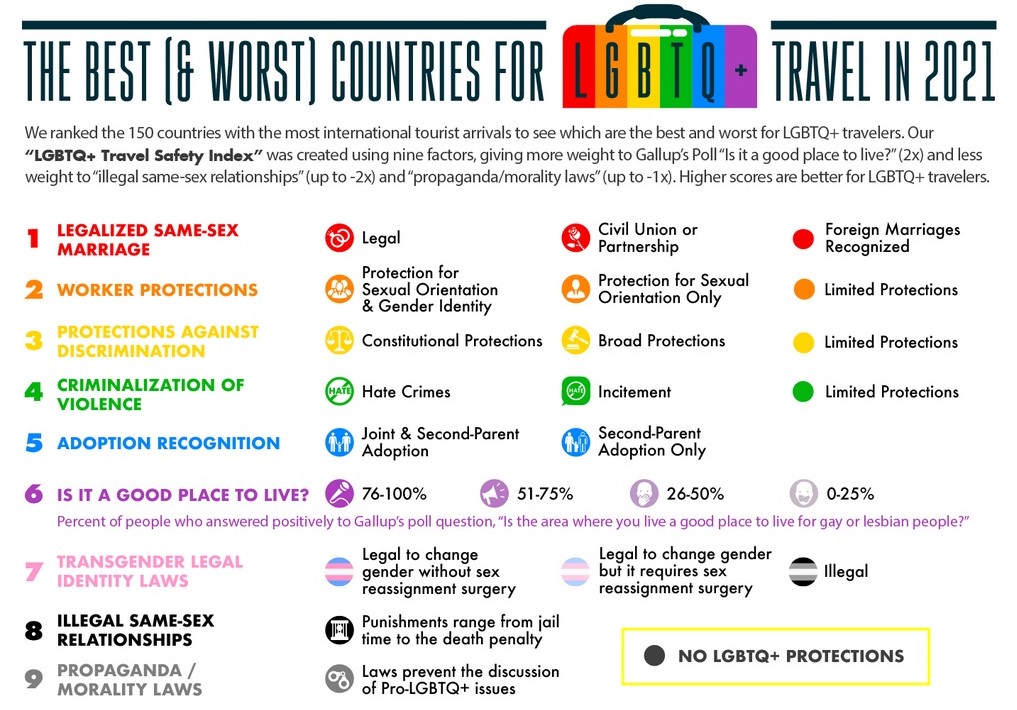
Source: Asherfergusson.com
According to the data collected by these criteria, the researchers gave Croatia an index of 188 points and a grade C+ from most safe to highest dangerous places (A to F), placing it among the first third of the best countries in the world in terms of LGBTQ+ safety.
In Croatia, the same sex-relationships are legal since 1977. However, same-sex marriage or families are not permitted, but same-sex life partnership is (i.e., civil union). The Life Partnership Act came into force back in 2014, and since then, hundreds of life partnerships have been concluded, with male life partnerships being slightly more common than female. Also, it is legal to change gender without sex reassignment surgery.
Violence against the members of the LGBTQ community is considered a hate crime in Croatia. Although this study says only sexual orientation is protected in Croatia, the truth is, both sexual orientation and gender identity are protected by numerous Croatian laws. The protections against discrimination are broad, although not constitutional. Croatian Constitution still does not include same-sex families, defining marriage only as "a life-long community of woman and man." However, one year ago, the Constitutional Court gave the right to same-sex couples in Croatia to be foster parents. Before, only single gay people could adopt children.
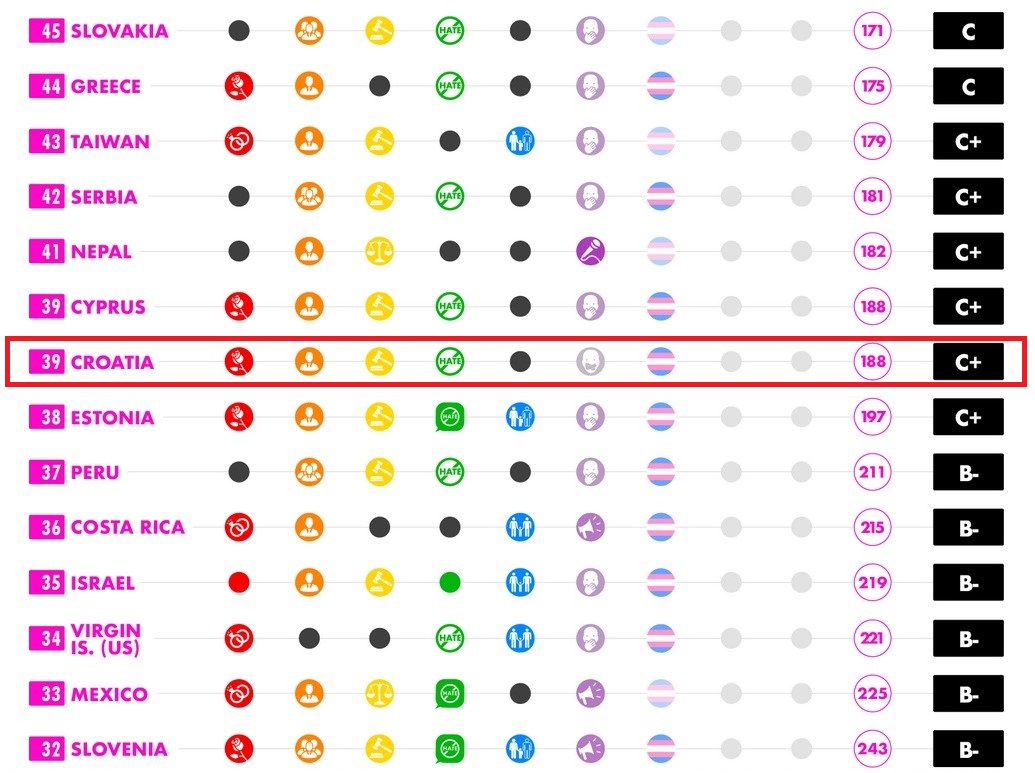
Source: Asherfergusson.com
The top ten safest countries for LGBTQ+ travel are Canada, the Netherlands, Sweden, Malta, Portugal, Belgium, the United Kingdom, Spain, Norway, and France. At the very end of the list, being the world's least safe countries for LGBTQ+ travel are Nigeria, Saudi Arabia, Malaysia, Malawi, Oman, Jamaica, Myanmar, Qatar, UAE, and Yemen.
Interestingly, the study shows that less than 25 percent of people said Croatia was a good place to live, according to Gallup's poll question's votes. These statements are arguable since one can experience life and circumstances in Croatia only by visiting it personally. Nonetheless, many places in Croatia have been gay-friendly for a long time, especially tourist destinations.
LGBTQ-friendly destinations in Croatia
Among Croatia's popular tourist destinations, Dubrovnik is considered the most LGBTQ-tolerant, while its neighboring island of Lokrum welcomes gays on nudist beaches. Of other popular Croatian coastal destinations, Split, Rovinj, Krk, Rab, Rijeka, and Hvar also welcome members of the LGBTQ community. Rab island has also become the first declared gay-friendly destination in Croatia.
Naturally, any larger town in Croatia that depends on tourism is accommodating, and gay and lesbian couples won't face discrimination. Some even go that far as to say that Croatia is one of the most tolerant countries in Europe for LGBTQ+ travelers. Meanwhile, people in smaller towns in rural parts of Croatia, due to their high traditional and religious values, tend to be very judgemental.
Last year, Croatia saw 66 new same-sex life partnerships, increasing for as many as 47 life partnerships than in 2019. Most of them were registered in Zagreb and Primorje-Gorski Kotar and Istria counties. The first gay marriage was even held in Slavonia, in Kutjevo, where such marriages are still not very well accepted among citizens, which gained a lot of interest there.
Bigger cities such as Zagreb find same-sex marriages and LGBTQ communities acceptable, as proven by the Zagreb Pride celebration of many years standing, even in pandemic-marked 2020. Still, a recent horrific hate crime perpetrated in Zagreb's Maksimir Park against a gay man, when two attackers threw a Molotov cocktail on him and caused him second-degree burns. Zagreb Pride association later condemned the attack, calling it the "worst anti-gay hate crime ever reported in Croatia." They and such associations, most of which are located in Zagreb, are trying to improve the position of LGBTQ people in the community, i.e., in Croatia.
Pride celebrations have also been organized in Croatian cities of Split and Osijek, while some other supporting celebrations occasionally happened in Rijeka and Pula as well. Also, Croatia's numerous music festivals and carnivals always welcome LGBTQ music lovers.
Although not all Croatians are tolerant, nor does Croatia have all legal protections for gay or lesbian persons, it seems like times are slowly changing for the better in creating a safe and tolerant environment for LGBTQ+ people.
For the latest travel info, bookmark our main travel info article, which is updated daily.
Read the Croatian Travel Update in your language - now available in 24 languages.
Tourism Ministry Announces Campaign for 'Safe Stay in Croatia' Label
February 1, 2021 – The Ministry of Tourism and Sport will launch a campaign for the "Safe Stay in Croatia" label in mid-February, which will show tourists that Croatia applies health and safety protocols during the coronavirus pandemic.
After announcing that the Ministry was preparing a "Safe travel" label for the upcoming tourist season, Minister of Tourism and Sports Nikolina Brnjac confirmed today that they would start the campaign in mid-February.
Tourism must show adaptability and responsibility
As Hina reports, apart from tourist entities for which this label is intended, airlines, gas stations, various tourist facilities, cultural and natural attractions will also use it. The protocols will be harmonized with the recommendations of the Croatian Institute of Public Health (HZJZ). It will also include a sticker with a QR code that can be displayed in a visible place. As part of the promotion, a special website will also be launched.
The Ministry will assign and keep the labels free of charge and monitor their application with associations.
"In addition to the application of these protocols, important preconditions for achieving tourist results are a favorable epidemiological situation, a sufficient level of vaccination, and the perception of destination security. Croatia was recognized for that last year. We will continue to work on it in 2021. Due to the pandemic, the tourism sector will again have to show creativity, adaptability, responsibility, and cooperation," said the Minister.
Adherence to global standardized health protocols
Noting that the introduction of these labels is an important wheel in branding Croatia as a safe destination, the Minister expects that by Easter, it will contribute to the promotion, recalling that it is essential to continue to adhere to epidemiological recommendations and measures.
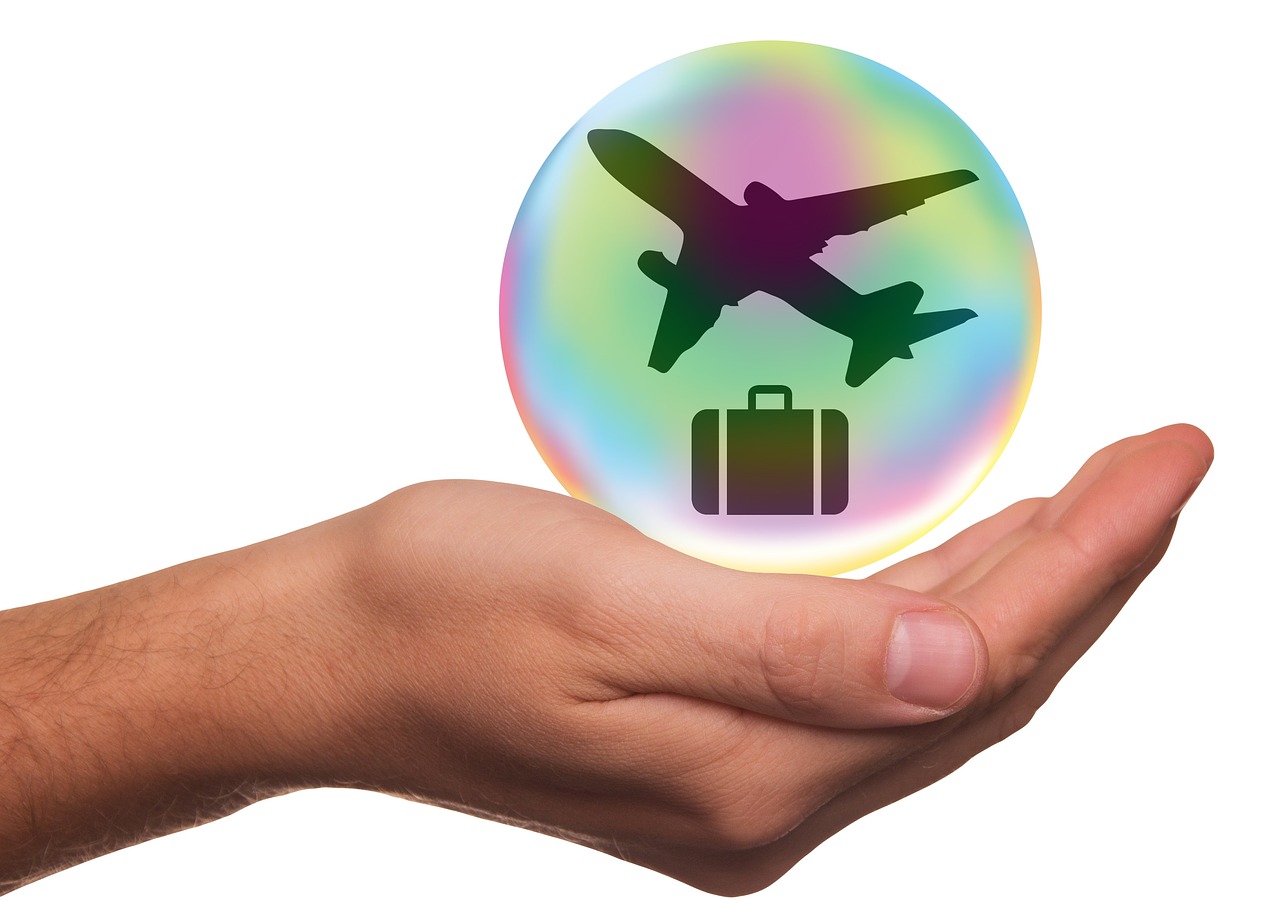
Source: Pixabay
The labels are a national upgrade of last year's "Safe Travel" labels of the World Travel and Tourism Council (WTTC) to make it easier to identify destinations and companies that adhere to global standardized health and hygiene protocols. The Croatian Ministry of Tourism and Sport immediately got involved. Harmonization of safety protocols for restaurants, hotels, family farms, holiday homes, beaches, marinas, boats, travel agencies, rent-a-car, tourist guides was one of the first tasks of the Council for the Repair and Development of Tourism.
Slow vaccine distribution not in favor of tourism trends
Minister Brnjac said that the vaccine is excellent news for tourism. Vaccination of tourism workers, for which about 70 percent of them are interested in Croatia, will play an important role in tourism promotion and results.
She says the slow distribution of vaccines and vaccinations, the new strain of the virus, and the growing number of infections in Europe and the world, are not in favor of tourism trends. It is necessary to open borders and overcome the psychological barrier of fear to travel again. It is encouraging that the EU insists on an agreement on the quantity and dynamics of vaccine delivery.
"We hope that in Croatia, as in other EU member states, a good initial vaccination rate will continue. Given the current situation with the vaccine at the EU level, Croatia's position is to insist on talks with pharmaceutical companies on the agreed quantity and dynamics of vaccine delivery," adds Brnjac.
Among other things, Croatia is in contact with representatives of other EU member states. At the moment, all EU member states want to speed up vaccination.

Source: Pixabay
Regarding the introduction of measures for tourist arrivals and border crossings, the Minister recalls that EU leaders agreed to work on a standardized form of evidence of vaccination in compliance with EU data protection regulations. This certificate would, for the time being, be used exclusively for medical purposes.
"For crossing Croatia's border, a negative PCR test result not older than 48 hours should be presented, or PCR testing should be performed immediately upon arrival (at one's own expense), with the obligation of self-isolation until a negative result. If it is impossible to test, a self-isolation measure will last for ten days. Further measures will be subject to the course of the epidemiological situation in Croatia, but also specific markets," said the Minister.
Croatia recommended destination for 2021
In the current situation, the Minister considers it's good that the people from foreign markets are eager to travel. It's even better that Croatia is mentioned as a desirable destination, thanks to the proximity to many markets and good transport links, especially road.
"This year, we expect a distinct 'last-minute' demand and demand for safe, fast, and easily accessible destinations, as well as accommodation that provides additional security such as holiday homes, on boats, in camps, and staying outdoors in nature. There are expectations from domestic tourists, who can be a driver of tourism, as well as from the cooperation with the European Association of Travel Agencies and Tour Operators (ECTAA), according to which Croatia in 2021 has the status of a selected and recommended destination," says the Minister.
She believes that a favorable epidemiological situation will be maintained in Croatia with the adherence to the measures. The tourism sector is ready to prove its responsibility and provide a safe stay this year as well. Through cooperation, knowledge, and experience, Croatia will continue to position itself as a desirable destination for foreign and domestic tourists.
For the latest travel info, bookmark our main travel info article, which is updated daily.
Read the Croatian Travel Update in your language - now available in 24 languages.
Tourism Ministry Readying 'Safe Travel' Labels for 2021 Croatian Tourist Season
January 19, 2021 - The Croatian Tourism Ministry will award 'Safe Travel' labels to hotels and tourist facilities ahead of the 2021 Croatian tourist season.
Unlike some countries, such as Greece, Hungary, and Estonia, which have announced the introduction of COVID passports for tourists intending to visit, the Croatian Tourism Ministry has taken the view that "the COVID passport system has not been developed at the EU level" and that they will await the decision from the EU, reports Jutarnji List.
It can be learned unofficially that Croatia is not in favor of introducing COVID passports at the moment and that this will be its starting position at a virtual meeting next Thursday, at which EU heads of state or government will discuss this topic.
COVID-passport is a colloquial name for a vaccination certificate, i.e., a certificate that a person has vaccinated against coronavirus, which in some EU countries could replace rigorous measures when crossing the border, like presenting a negative PCR test or quarantine. In other words, a vaccinated tourist who has this certificate (COVID-passport) with them could enter the country without hindrance.
The idea was first put forward publicly by Greek Prime Minister Kyriakos Mitsotakis, who believes it will help kick-start the recovery of the tourism and travel industry. According to the draft of the new law, France envisages the introduction of 'green passports' for people who have been vaccinated. The draft law also states that those who cannot prove they are negative for COVID-19 or have not been vaccinated are "banned from certain activities and access to public transport, restaurants, cultural institutions, and other public places." Spain has also been announced that the authorities there will register their citizens who refuse to be vaccinated and share it with other EU countries.
The idea is controversial from a legal point of view because, in most countries, vaccination cannot be mandatory. On the other hand, there must be no discrimination in the rights of freedom of movement. Another problem will be that citizens still cannot decide for themselves when they will be vaccinated because there will not be enough vaccines for at least a few more months for everyone to be vaccinated.
"To introduce such a restrictive measure in Croatia, it should be acknowledged that the situation is so serious - extraordinary - that it requires quite extraordinary human rights restrictions. Since such a thing is uncommon, we would have to be in a state of a great natural disaster (Article 17 of the Constitution), so the introduction of such a measure would have to be decided by Parliament by a two-thirds majority of all deputies. Or, in other words, as long as the government claims that we have a regular state of constitutional law (Article 16 of the Constitution), this type of restriction cannot be introduced, which represents a kind of coercion," explains Djordje Gardasevic from the Department of Constitutional Law at the Faculty of Law in Zagreb.
While an agreement is awaited in Brussels, the Croatian Tourism Ministry is preparing a list of hotels and tourist facilities that will be awarded the 'Safe Travel' label as proof that they are safe for guests because they respect epidemiological protocols. In about twenty days, the Ministry will start a campaign, 'Safe stay in Croatia,' and will award these labels.
"Safety protocols are being prepared for accommodation and catering facilities, including for nautical tourism, and the label will be harmonized with the recommendations of the Croatian Institute of Public Health, which are currently in force. The labels will be awarded at the beginning of February, and the Ministry of Tourism and Sport will keep records of entities with national labels and conduct ad hoc checks on compliance with the measures," reads the official response of the Ministry of Tourism.
At the end of last summer, Croatia became one of the countries that received the WTTC seal for safe travel, created by the World Travel and Tourism Council (WTTC). The 'Safe Travel' trademark was designed to enable travelers to identify destinations and companies worldwide that have adopted global standardized health and hygiene protocols. In a way, it is a guarantee to tourists that they will stay in a facility that adheres to coronavirus control protocols.
"We will have two types of Safe Travel labels - WTTC and national - and the application of safety protocols and achieving the required level of vaccinating tourism workers and the entire population will contribute to strengthening Croatia as a desirable and safe tourist destination, where guest safety comes first," explained Ivana Crnić, spokeswoman for the Ministry of Tourism and Sport.
"The list will include hotels, marinas, family farms, private accommodation, even airports, and ferries. After all, we have already proven to be a safe destination because no tourists became infected in hotels in Croatia in the summer of 2020," said Crnić.
For the latest travel info, bookmark our main travel info article, which is updated daily.
Read the Croatian Travel Update in your language - now available in 24 languages.


